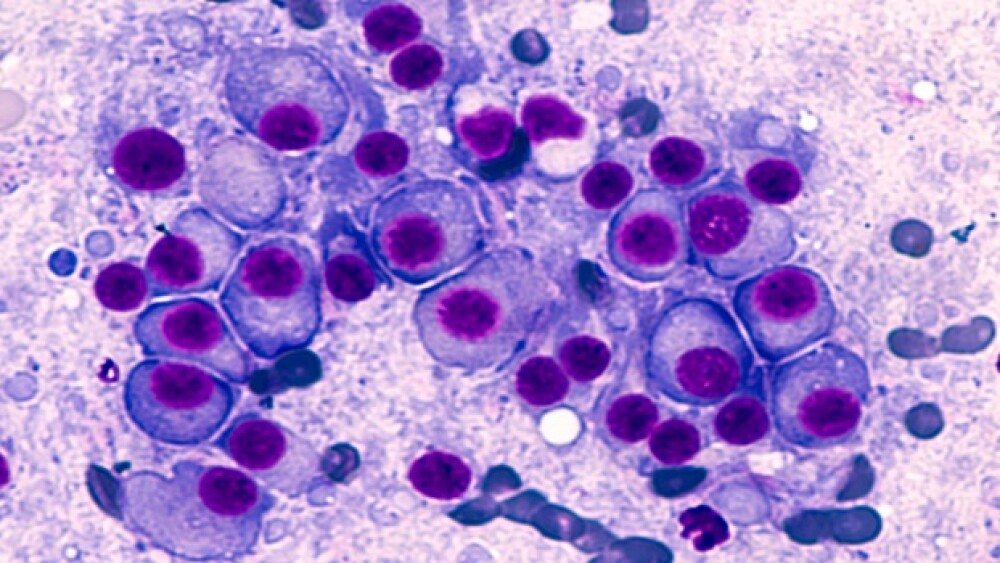REVLIMID, or lenalidomide, describes itself as “a new chemotherapy-free treatment combination.”
“Every day I wake up and enjoy my family and friends. I love my grandchildren and am thankful for every day I can share with them. I love sunshine,” quotes Debbie N., a multiple myeloma (MM) patient featured on REVLIMID’s “Share Your Moment” page. “After being diagnosed with MM, I was uncertain if I would ever be able to do my job again. Now I’m back to serving my community,” adds Jeffrey S., clad in his police officer uniform. REVLIMID, an immune-modulating therapy with proven anti-myeloma effects, features the page to encourage patients to submit such successes, stating that “small moments can mean a lot in your day-to-day life. Explore the moments that matter to other people and inspire others by sharing your own.”
REVLIMID, or lenalidomide, describes itself as “a new chemotherapy-free treatment combination.” “REVLIMID® in combination with a rituximab product, is used to treat adult patients who have previously been treated for follicular lymphoma (FL). REVLIMID® in combination with a rituximab product, is used to treat adult patients who have previously been treated for marginal zone lymphoma (MZL).” The drug is used to treat MM, Myelodysplastic Syndromes (MDS), and Mantle Cell Lymphoma (MCL).
Multiple Myeloma, also known as Kahler’s disease, is a rare cancer that accounts for fewer than 200,000 US cases per year. “Multiple myeloma is a cancer that forms in a type of white blood cell called a plasma cell. Plasma cells help you fight infections by making antibodies that recognize and attack germs. Multiple myeloma causes cancer cells to accumulate in the bone marrow, where they crowd out healthy blood cells. Rather than produce helpful antibodies, the cancer cells produce abnormal proteins that can cause complications,” describes the Mayo Clinic.
Though the causes of myeloma are unclear, “Doctors know that myeloma begins with one abnormal plasma cell in your bone marrow — the soft, blood-producing tissue that fills in the center of most of your bones. The abnormal cell multiplies rapidly. Because cancer cells don’t mature and then die as normal cells do, they accumulate, eventually overwhelming the production of healthy cells. In the bone marrow, myeloma cells crowd out healthy white blood cells and red blood cells, leading to fatigue and an inability to fight infections. The myeloma cells continue trying to produce antibodies, as healthy plasma cells do, but the myeloma cells produce abnormal antibodies that the body can’t use. Instead, the abnormal antibodies (monoclonal proteins, or M proteins) build up in the body and cause problems such as damage to the kidneys. Cancer cells can also cause damage to the bones that increases the risk of broken bones.”
This is where REVLIMID steps in. “REVLIMID gives you multiple ways to fight multiple myeloma. REVLIMID is an immune-modulating therapy, known as an IMiD® agent, with proven anti-myeloma effects. REVLIMID is an oral therapy that was shown to work in 3 ways in animal models and in vitro.” First, REVLIMID will “Strike,” which “targets and kills myeloma cells.” Then, the drug will “Stimulate,” which “helps your immune system recognize and destroy myeloma cells.” Finally, the medication moves to “Starve,” which “prevents new myeloma cell growth by starving them of blood.”
The clinical trials of REVLIMID included “1 study of REVLIMID with dexamethasone in newly diagnosed patients, 2 studies of REVLIMID as a maintenance therapy after auto-HSCT, and 2 studies of REVLIMID with dexamethasone in patients who had at least 1 prior therapy.” 1,623 newly diagnosed patients who had not received a stem cell transplant were involved in the first-mentioned study, which evaluated “Progression-Free Survival (PFS)-how long a patient lives without the disease getting worse,” “Overall Survival (OS)—the length of time patients lived since the start of treatment,” and “Overall Response Rate (ORR)—how patients responded to treatment overall.”
The study concluded that patients who took REVLIMID with dexamethasone continuously experienced “Longer Progression-Free Survival (PFS) compared to patients who took REVLIMID with dexamethasone for only 18 months, or a combination of melphalan, prednisone, and thalidomide,” “Longer Overall Survival (OS) compared to patients who took a combination of melphalan, prednisone, and thalidomide,” and “Higher Overall Response Rate (ORR) compared to 73% of patients who took REVLIMID and dexamethasone for only 18 months and 62% of patients who took the combination of melphalan, prednisone, and thalidomide.” The latter two studies concluded that REVLIMID maintenance therapy results in Longer Progression-Free Survival and Longer Time to Progression.
With such outstanding trial results, REVLIMID has proven efficacy in MM treatment, and is remarked as “an effective longer-term treatment option in patients with newly diagnosed multiple myeloma ineligible for stem-cell transplantation.” In the words of Marc D., another MM patient who shared his moment with REVLIMID, he now spends his time “living and loving life in full every day — with family and friends.”





